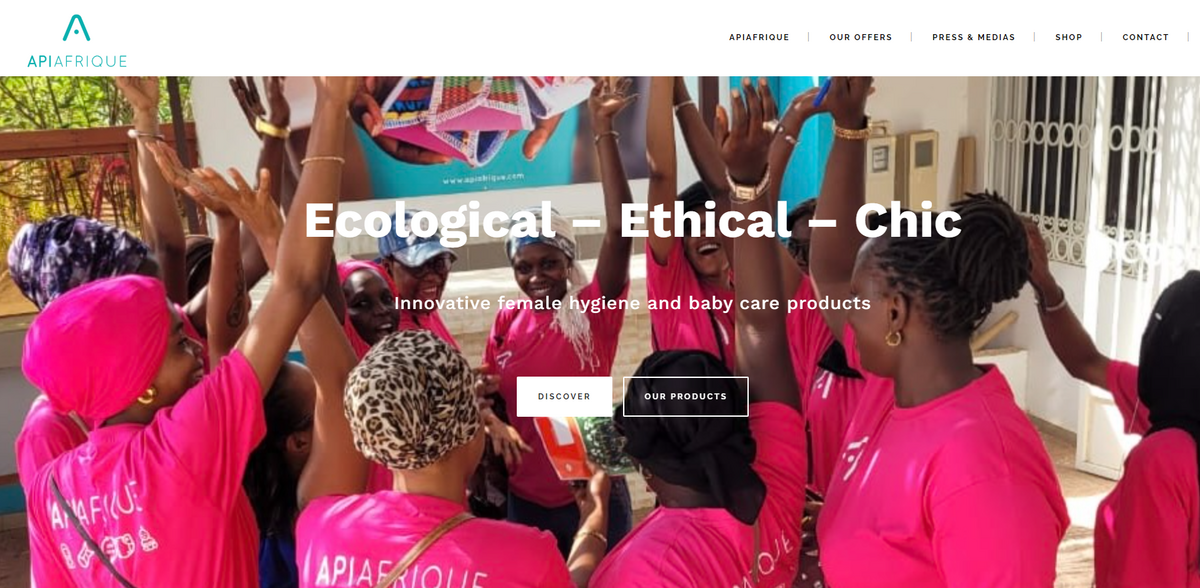What is ApiAfrique?
ApiAfrique is a Senegalese social enterprise that emerged in 2017 through the vision and collaboration of three women and one man, each bringing unique expertise, life experiences, and a shared desire to create positive change. This project in the textiles industry innovates by offering beautiful, healthy, and ecological hygiene products designed for women and babies. Born from a collective commitment to ethical and sustainable practices, ApiAfrique combines the artisanal skills of its team with state-of-the-art manufacturing in Senegal. The enterprise’s roots run deep in local culture and heritage, with every product representing a blend of tradition, modernity, and a genuine concern for the planet.
Main Benefits of ApiAfrique
ApiAfrique provides a multitude of benefits that support both its consumers and the environment. Key figures and facts include:
- Manufacturing location: Ngaparou in the Thiès region, Senegal
- Team composition: Over 25 employees, 90% of whom are women
- Environmental impact: Products can be reused approximately 400 times, significantly reducing waste
- Waste reduction: From birth to toddlerhood, a baby uses an average of 5,000 diapers, while a woman uses about 8,000 menstrual products over her lifetime; disposable alternatives contribute nearly 1 ton of waste taking 450 years to biodegrade
- Bcorp score: 147.8, reflecting high standards in social and environmental accountability
- Product range: The offerings include couches lavables, serviettes hygiéniques, sanitary pads, and diapers that are both reusable and écologique.
Local Heritage and Production
At the heart of this dynamic venture is a commitment to “Made in Senegal.” The products and their packaging are all produced locally, driven by a predominantly female workforce. The legacy of traditional textile techniques blends seamlessly with innovative design, resulting in hygiene products that are organic, bio, and ethically confectioned. This authentic local production not only supports regional economic growth but also resonates with consumers who value heritage and craftsmanship in every item they purchase.
Commitment to the Environment
ApiAfrique is a champion for the environment, offering sustainable alternatives in a world increasingly burdened by disposable waste. The mission is crystal clear: reduce waste through the creation of washable and reusable hygiene solutions. The casual but determined focus on zero déchet, zero waste initiatives is embedded in every step of the process—from choosing certified organic cotton and eco-friendly materials that preserve health, to rigorous testing and improvement of prototypes before series manufacturing. It is an approach that feels both responsible and refreshingly innovative, like a deep breath of clean air in a cluttered room.
Empowerment and Craftsmanship
One of the standout aspects of ApiAfrique is its dedication to promoting female empowerment. The manufacturing processes occur under conditions that foster legal, safe, and skill-enriching environments. Nearly 95% of the workshop’s team in Ngaparou comprises women, which highlights an earnest commitment to gender equality and empowerment—especially for menstruating girls, women, and those who seek alternatives to traditional hygiene options. The project beautifully illustrates how local expertise and small-scale innovation can translate into global influence while supporting women in every aspect of the production chain.
Project Impact on Global Sustainability
- SDG 3 – Good Health and Well-being: By offering products that promote hygienic practices using organic and safe materials, ApiAfrique supports healthier lives for women and babies around the globe.
- SDG 5 – Gender Equality: The project’s strong focus on employing and empowering women in Senegal underscores its commitment to achieving gender equality and empowering all women and girls.
- SDG 12 – Responsible Consumption and Production: With reusable designs and a zero waste approach, ApiAfrique sets a benchmark for sustainable production and responsible consumption patterns in the textiles sector.
- SDG 13 – Climate Action: Reducing massive waste from disposable hygiene products contributes indirectly to climate action by lowering the environmental burden associated with long-term degradation.
- SDG 8 – Decent Work and Economic Growth: By creating jobs and fostering a safe working environment, particularly for women, the enterprise contributes to sustainable economic growth in the region.
A Vision for a Sustainable Future
ApiAfrique signifies more than just a brand—it is a movement that harnesses social entrepreneurship to drive real change. The enterprise’s journey started with a simple yet powerful idea: to offer innovative and eco-friendly hygiene products that make a tangible difference in people’s lives. With experience ranging from reusable hygiene products to refined textile design and production, the founders have managed to combine form, function, and a commitment to health. The story of ApiAfrique is a vivid reminder that ethical practices combined with innovative ideas can revolutionize an entire industry. Its products speak to modern consumers who value style and sustainability equally; each sanitary pad, diaper, and piece of eco-friendly textile carries a message of care—care for the environment, for health, and for future generations. In a world where even small steps can lead to monumental shifts, ApiAfrique stands out as a beacon of hope and practicality…


















